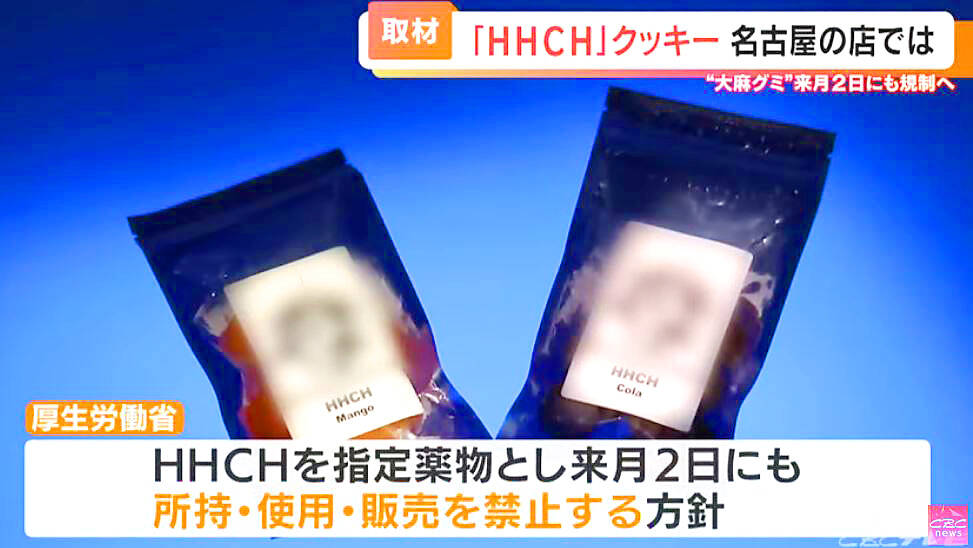Taiwanese visiting Japan should beware of consuming cannabinoid gummies following recent reports of numerous people in Tokyo falling ill after taking them, the Japanese Ministry of Foreign Affairs has warned.
On Nov. 4, five people aged from their teens to their 50s fell ill after taking gummies containing hexahydrocannabihexol (HHCH) — a substance that mimics cannabis — sold to them by a man at a festival in western Tokyo, Japanese media reported.
In the first two weeks of this month, 11 others reported similar symptoms after consuming HHCH gummies at subway stations, parks and apartments, the Tokyo Fire Department said.

Photo: Screengrab from Japan’s CBC News’ YouTube channel
Japanese Minister of Health, Labour and Welfare Keizo Takemi on Monday said his ministry plans to ban HHCH.
It would be designated a psychoactive drug and possessing, using or distributing the substance would soon be illegal, he said.
Fan Chen-kuo (范振國), secretary-general of the Ministry of Foreign Affairs’ Taiwan-Japan Relations Association, said in Taipei yesterday that Taiwan’s representative office in Tokyo had earlier this month received calls for help from Taiwanese living or traveling in Japan.
Family members of one of the individuals contacted the office after they were unable to get in touch with one of their adult children, who was later taken to hospital after consuming gummies, Fan said.
Gummies containing HHCH can easily be found in stores in Tokyo and Osaka, and online, Fan said, calling on people to stop consuming them due to the physical discomfort they can cause.
Fan said that HHCH could be banned in Japan as soon as Saturday next week.
Once it is listed as an illegal drug, Taiwanese caught buying, selling or consuming HHCH gummies would face legal consequences in Japan, he said.
The Japanese Ministry of Health, Labour and Welfare is considering banning all substances with a similar structure to HHCH, which can cause hallucinations and memory impairment, Japanese media have reported.
Tetrahydrocannabinol, the primary psychoactive compound of cannabis is banned in Japan and Taiwan.

The brilliant blue waters, thick foliage and bucolic atmosphere on this seemingly idyllic archipelago deep in the Pacific Ocean belie the key role it now plays in a titanic geopolitical struggle. Palau is again on the front line as China, and the US and its allies prepare their forces in an intensifying contest for control over the Asia-Pacific region. The democratic nation of just 17,000 people hosts US-controlled airstrips and soon-to-be-completed radar installations that the US military describes as “critical” to monitoring vast swathes of water and airspace. It is also a key piece of the second island chain, a string of

A magnitude 5.9 earthquake that struck about 33km off the coast of Hualien City was the "main shock" in a series of quakes in the area, with aftershocks expected over the next three days, the Central Weather Administration (CWA) said yesterday. Prior to the magnitude 5.9 quake shaking most of Taiwan at 6:53pm yesterday, six other earthquakes stronger than a magnitude of 4, starting with a magnitude 5.5 quake at 6:09pm, occurred in the area. CWA Seismological Center Director Wu Chien-fu (吳健富) confirmed that the quakes were all part of the same series and that the magnitude 5.5 temblor was

The Central Weather Administration has issued a heat alert for southeastern Taiwan, warning of temperatures as high as 36°C today, while alerting some coastal areas of strong winds later in the day. Kaohsiung’s Neimen District (內門) and Pingtung County’s Neipu Township (內埔) are under an orange heat alert, which warns of temperatures as high as 36°C for three consecutive days, the CWA said, citing southwest winds. The heat would also extend to Tainan’s Nansi (楠西) and Yujing (玉井) districts, as well as Pingtung’s Gaoshu (高樹), Yanpu (鹽埔) and Majia (瑪家) townships, it said, forecasting highs of up to 36°C in those areas

IN FULL SWING: Recall drives against lawmakers in Hualien, Taoyuan and Hsinchu have reached the second-stage threshold, the campaigners said Campaigners in a recall petition against Chinese Nationalist Party (KMT) Legislator Yen Kuan-heng (顏寬恒) in Taichung yesterday said their signature target is within sight, and that they need a big push to collect about 500 more signatures from locals to reach the second-stage threshold. Recall campaigns against KMT lawmakers Johnny Chiang (江啟臣), Yang Chiung-ying (楊瓊瓔) and Lo Ting-wei (羅廷瑋) are also close to the 10 percent threshold, and campaigners are mounting a final push this week. They need about 800 signatures against Chiang and about 2,000 against Yang. Campaigners seeking to recall Lo said they had reached the threshold figure over the